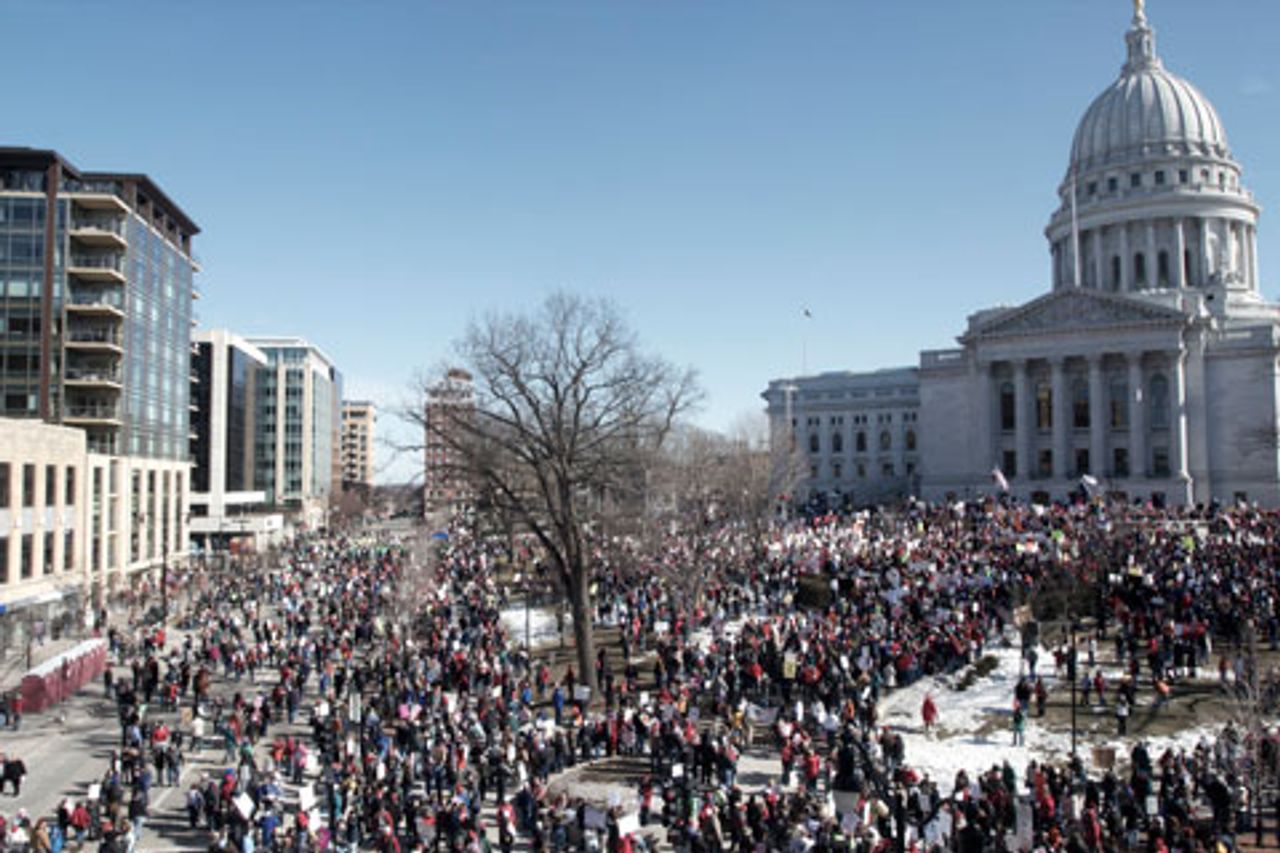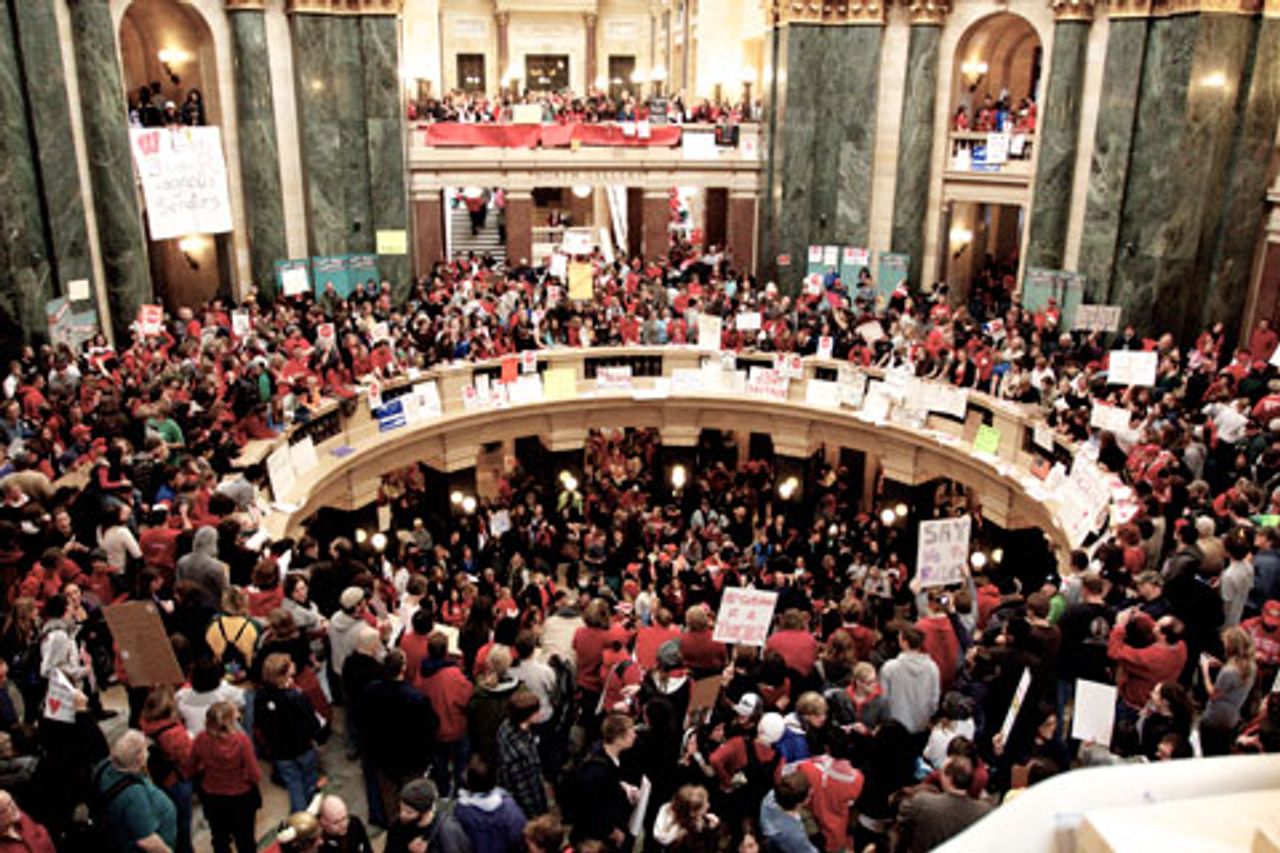The victory of Republican Governor Scott Walker in the Wisconsin recall election is the predictable outcome of the sabotage by the trade unions and the Democratic Party of the mass protest movement that erupted in the Midwestern US state in February 2011.
 Thousands demonstrate outside the capitol in Madison, February, 2011
Thousands demonstrate outside the capitol in Madison, February, 2011The reelection of Walker will lead to an escalation of the attack on public sector workers and social programs in Wisconsin and around the country. The Obama administration—which demonstrably distanced itself from the anti-austerity sentiment of workers in the state—will use the results to justify a further shift to the right.
Even if Walker’s Democratic challenger, Milwaukee Mayor Tom Barrett, had won, he would have continued the savage austerity measures of Walker. That is what Democratic governors are doing in California, New York and other states, and the Obama administration is doing on a national level.
What the experience of Wisconsin shows is that the working class cannot take one step forward in defending its elemental rights as long as it remains shackled to the Democratic Party. Whatever their pretensions about being a party of the “people,” the Democrats, no less than the Republicans, defend the financial and corporate aristocracy that rules America.
As part of the SEP team that fought to provide leadership to the working class in Wisconsin last year, I was a witness and active participant in those events. Drawing the lessons of that struggle is critical for workers today, not only in the US but throughout the world.
In the winter of 2011, after nearly three decades in which the trade unions had suppressed every form of working class resistance—leading various demoralized “left” and liberal intellectuals to pronounce the death of the class struggle—the American working class powerfully returned to the scene of history.
 Protesters occupy the capitol rotunda February, 2011
Protesters occupy the capitol rotunda February, 2011Hundreds of thousands of teachers, nurses, firefighters, industrial workers, high school and college students participated in the month-long movement against Walker’s “Budget Repair Bill,” which threatened to strip public employees of workplace rights and virtually criminalize any collective resistance by workers.
The mass protests—the largest working class movement in the US since the 1980s—were fuelled by the pent-up anger over social inequality, the Wall Street bailout and a profound sense that the entire economic and political system was hostile to workers.
In the crowds, I saw signs referencing the French Revolution of 1789, with pictures of guillotines and the ill-fated Marie Antoinette. Workers and youth were also inspired by the revolutionary events in Egypt, carrying signs saying “Walk like an Egyptian” and comparing the Wisconsin governor to Hosni Mubarak.
Sections of the middle class—professionals, small businessmen and farmers—also supported the movement, underscoring that it is the working class, not the media-created Tea Party, that gives voice to the aspirations of the majority of American people.
From the outset, however, the most critical question was what strategy would guide this struggle. The Socialist Equality Party fought to provide political leadership and mobilize the full industrial and political strength of the working class against Walker and the profit system he defends. We opposed all those who sought to keep the working class tied to the Democratic Party by peddling the lie that this big business party would defend them. This included various liberals such as the Nation’s John Nichols and MSNBC’s Ed Schultz, as well as upper-middle class pseudo-left groups like the International Socialist Organization (ISO).
The unions—which had played virtually no role in the student walkouts, teacher job actions and occupation of the state capitol that sparked the movement—did everything they could to shut down the protests and prevent them from spreading nationally into a confrontation with the Obama administration.
Officials from the American Federation of State, County and Municipal Employees (AFSCME) and the Wisconsin Education Association Council (WEAC) said they would agree to the governor’s demands for $330 million in concessions from their members, which included a de facto pay cut of $4,000 a year for each worker through increased health care premiums and pension payments.
The unions limited the struggle to the self-interests of the labor apparatus, including defending their legal position as “representatives” of the workers and their continued deduction of union dues from workers’ paychecks.
The state Democrats rallied to the defense of the institutional interests of the union apparatus. In addition to providing financial support to the Democrats, the unions play a crucial role in suppressing the class struggle. I heard one state legislator boasting that the Democrats had carried out the deepest cuts in the history of Wisconsin but had avoided a social explosion precisely because they had used the services of the unions.
In an effort designed to take the initiative out of the hands of the working class, 14 Democratic state legislators left the state to delay a vote on Walker’s Budget Repair Bill. By early March, however, it was clear that they were prepared to pack it in and allow the passage of the measure.
Faced with the intransigence of the governor, workers realized that protests were not sufficient and support grew for a general strike. The sign of one Madison teacher I spoke with summed up the sentiment: “Scooter [Scott Walker] will let us yell all we want so…GENERAL STRIKE!”
The Socialist Equality Party fought for workers to organize a general strike to demand the immediate resignation of Walker and his administration. Such a struggle, we insisted, had to be organized independently of the unions and demand a total rejection of all economic concessions. In opposition to budget cutting, we called for a sharp expansion of social spending to be paid for by an increase in taxes on corporate profits and the very rich. We also demanded the overturning of all efforts to curtail the legal rights of workers to negotiate and strike.
The call for Walker’s removal, we said, did not imply a vote of confidence in the Democratic Party. On the contrary, the fight in Wisconsin, the SEP insisted, raised the most important issue of all: “the necessity for workers to create their own independent, socialist alternative to the corporate-controlled Republican and Democratic parties.”
It was precisely at the point when support for a general strike peaked—when Walker rammed through his Budget Repair Bill—that the trade unions called off the protests. Union officials dragged out charlatans like Jesse Jackson and other so-called “progressives” to give their blessing to this stab in the back and insist, as one Democratic legislator said, that workers should put down their picket signs and pick up clipboards to petition for a recall and the election of “anti-Walker” Democrats.
The supposedly “far left” ISO joined in the effort to bolster the Democrats. In a statement following the passage of Walker’s bill, the ISO praised the political stunt carried out by the 14 Democratic senators who left the state, saying, “The ‘Flight of the Fourteen’ Democrats is a reminder—and a needed one after so many years with few if any examples—that Democratic politicians can be pressured to act by mass protest.”
Such statements make it clear that groups like the ISO are nothing more than the left wing of the bourgeois establishment, whose central political role is to channel social opposition within the confines of the Democratic Party. They are engaged in a reprise of their role in Wisconsin by promoting the reelection campaign of Obama, who supposedly also can be pressured to represent workers.
The outcome of the recall election is a damning indictment of all of these defenders of the capitalist status quo. It is also a vindication of the warnings of the Socialist Equality Party.
During the month-long battle in Wisconsin, the working class began to manifest its immense capacity for struggle, sacrifice and solidarity. The most fundamental lesson that must be drawn to prepare future struggles is that this capacity must be fused with a thoroughly worked out political program and guided by a leadership that has demonstrated in practice that it represents the interests of the working class. The Socialist Equality Party is that leadership and we call on workers to support our election campaign and to join and build our party.
For more information on the SEP campaign, visit socialequality.com.
